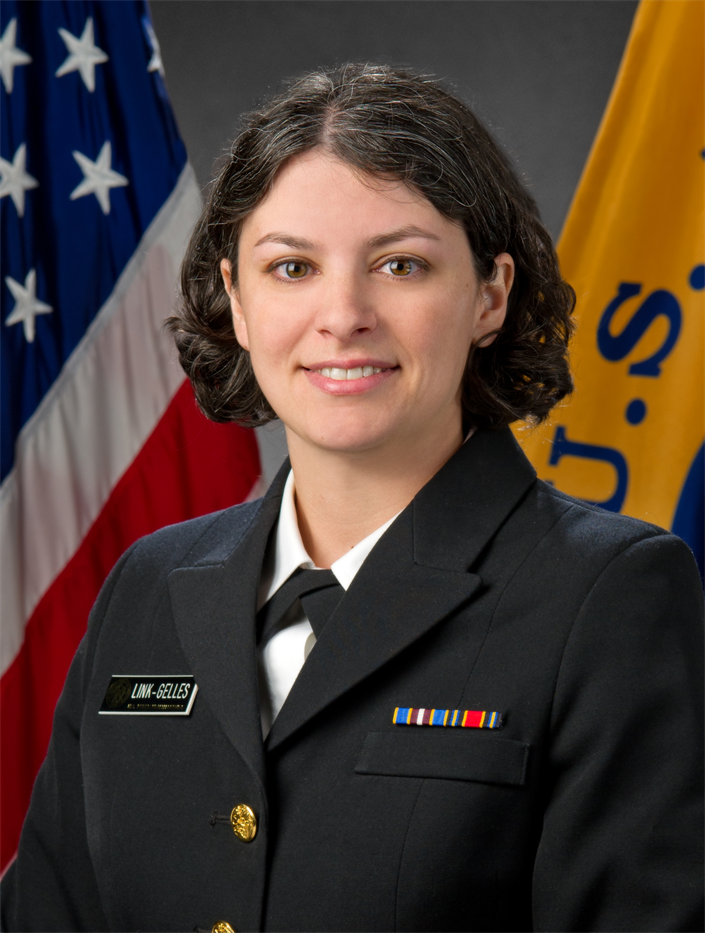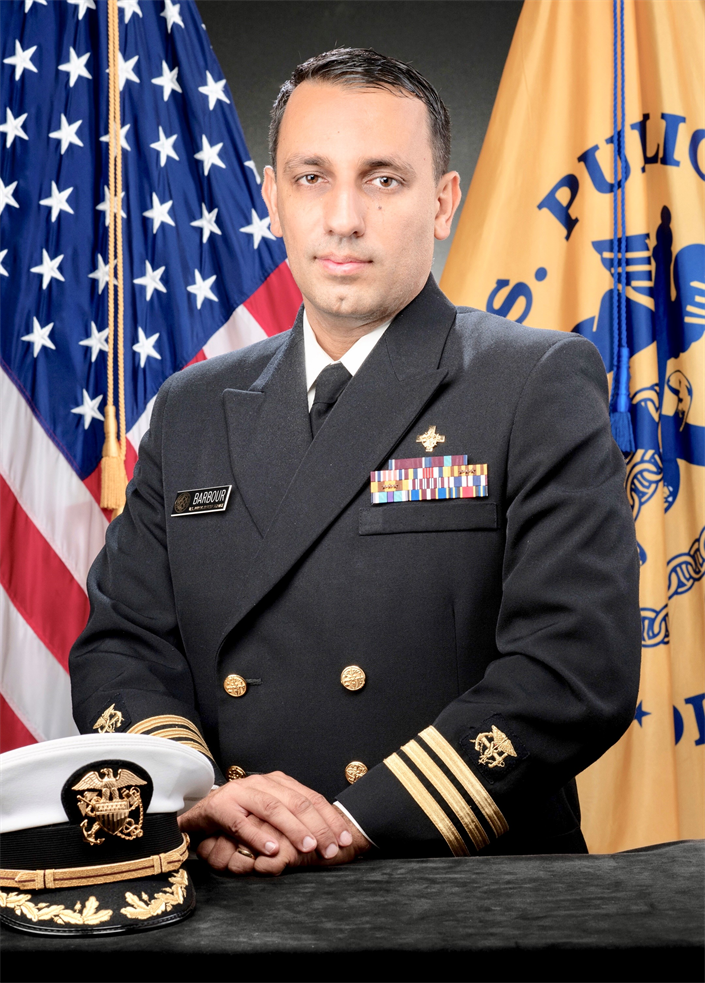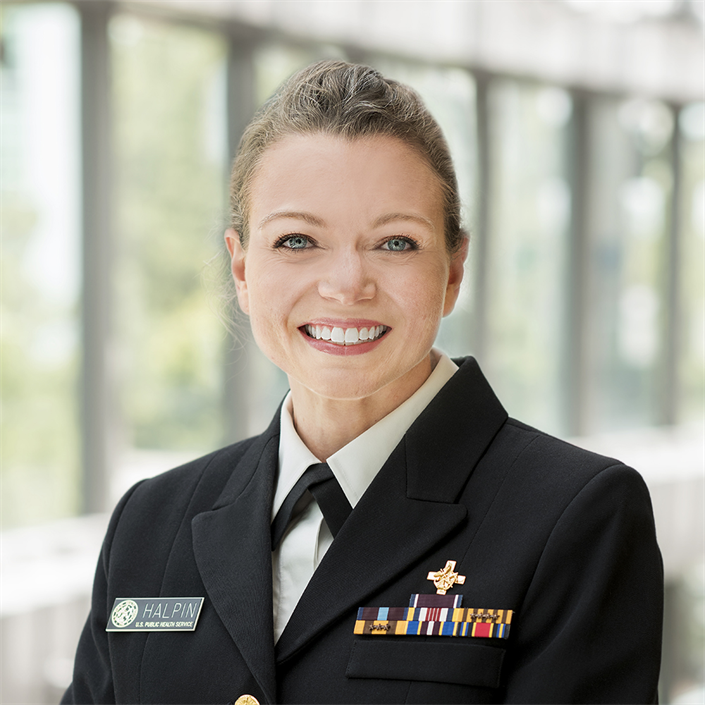2021 SHALON M. IRVING MEMORIAL Junior Scientist Officer of the Year Award Winner
LCDR Ruth Link-Gelles

LCDR Link-Gelles serves as an epidemiologist in CDC’s Division of Viral Diseases. Since Summer 2020, she has served on CDC’s COVID-19 Vaccine Task Force, where she leads vaccine distribution for long-term care facilities, ensuring access to vaccine for those hit hardest by the COVID-19 pandemic. Aside from COVID-19, LCDR Link-Gelles primarily focuses on measles and polio and led CDC’s recent efforts to create a preparedness plan for a breach in laboratory containment of polio.
LCDR Link-Gelles completed her MPH in epidemiology at Emory’s Rollins School of Public Health in 2010 and worked in CDC’s Division of Bacterial Diseases from 2010-2016, primarily focused on surveillance for invasive pneumococcal disease and vaccine effectiveness of pneumococcal vaccines. After completing her PhD in 2016 at the University of North Carolina, she joined CDC’s Epidemic Intelligence Service (EIS) in 2016 and served in the Division of Viral Hepatitis working on hepatitis C elimination in the country of Georgia. After EIS, she served in CDC’s Division of Healthcare Quality Promotion working on outbreak response in healthcare settings.
She has deployed for numerous CDC emergency responses including Zika in American Samoa, a concurrent Hepatitis A and mumps outbreak in the Republic of the Marshall Islands, and measles in New York State. LCDR Link-Gelles has served in leadership roles within SciPAC since commissioning in 2016. She co-led the creation of a seminar series to help new officers navigate USPHS and SciPAC, laying the foundation for a successful Corps career. She served as co-chair of the Visibility Subcommittee for two years and upon being selected for SciPAC Voting Membership in 2020, took on the role of co-chair of the Website Subcommittee. LCDR Link-Gelles has been a member of a Tier-2 Corps deployment team, APHT-1 and deployed as part of the team to Puerto Rico for hurricane recovery in 2019.
2021 Derek Dunn Memorial Senior Scientist Officer of the Year Award Winner
CDR Kamil E. Barbour

CDR Barbour is a Supervisory Epidemiologist/Team Lead with over 10-years of experience at the CDC and in the USPHS. He completed his PhD in Epidemiology with a focus musculoskeletal disorders from the University of Pittsburgh in 2010 and immediately after commissioned into the USPHS via the CDC’s Epidemic Intelligence Service (EIS) program. In EIS, CDR Barbour deployed nationally (to investigate an outbreak of Mycoplasma pneumoniae in West Virginia) and globally in response to high-profile emergent infectious diseases, including to Haiti for cholera, Guinea for polio, and Jordan to educate communities on mitigation strategies to stem epidemics. Following EIS, CDR Barbour served as a staff epidemiologist in CDC’s arthritis program where he became globally recognized as a leading researcher in musculoskeletal diseases publishing many high impact papers. In 2018, he became the Team Lead of the State Chronic Disease Epidemiology Assignee program, where he supervises Corps officers and manages a prolific applied epidemiologic research program aimed at reducing risk for a range of chronic conditions. In this role, he applies his expertise to facilitate the growth of his supervisees, both as applied epidemiologists and Corps officers. Additionally, CDR Barbour directs and manages an $11M public health research portfolio for lupus and interstitial cystitis epidemiology, establishing six novel disease registries at major academic institutions and publishing cutting-edge research. He also oversees efforts by two national rheumatology organizations to implement the dissemination of lupus public health interventions.
Since commissioning in 2010, CDR Barbour has been a highly involved officer. He has held numerous leadership roles and has been particularly active on the SciPAC, where he has served as a Voting Member since 2016 and led as an Executive Board member and Subcommittee Chair for over 6 years. CDR Barbour has been a committed epidemiologist on RDF-1 since 2013, earning the Field Medical Readiness Badge by deploying for Ebola, and the National Emergency Preparedness Award for his commitment to the team. He also regularly volunteered with the Atlanta COA, participating in events to support the USO, environment, and vulnerable populations. He consistently represents the Corps in both recruiting events (three at major universities) and by presenting in uniform at >40 conferences, including four times at the USPHS Symposium (2015 to 2019). He currently serves as a Commissioned Corps Awards Board representative for the National Center for Chronic Disease Prevention and Health Promotion at the CDC (2018 to present), where he provides feedback on USPHS award nominations from his Center. In addition to the deployments above, he has responded to numerous other deployments, including for the Ebola and Zika viruses. Most recently, he deployed 4-times for COVID-19 including 1) with PHS to the JFK Quarantine Station in NYC, 2) as Epi and Analysis Team Lead in the Vaccine Taskforce, 3) as Associate Director of Science for the CDC’s Community Interventions and Critical Populations Taskforce, 4) as Deputy Team Lead for the High-Risk Populations Team. CDR Barbour also deeply values mentorship and serves as an official mentor to 4 junior Scientist Officers. He works closely with each to set goals to foster growth and leadership skills—and always checks in to track progress on benchmarks. CDR Barbour has received numerous USPHS, agency, and community-level awards, including the USPHS Outstanding Service Medal, the Distinguished Early Career Excellence Award from the University of Pittsburgh, and the Young Investigator Award from the American Society of Bone Mineral Research.
2021 Scientist Responder of the Year Award Winner
CDR Alison Halpin

CDR Alison Halpin is the Director of the Office of Scientific Innovation and Integration for the Clinical and Environmental Microbiology Branch of the Division of Healthcare Quality Promotion at CDC. She leads a group of epidemiologists, laboratory scientists and bioinformaticians leveraging novel laboratory and bioinformatics applications along with molecular epidemiology to improve patient safety and public health. Specifically, this group aims to better understand, prevent, and contain healthcare-associated and antibiotic resistant pathogens through outbreak investigations, surveillance for and detection of novel antibiotic resistance mechanisms, and understanding and leveraging human and environmental microbial communities.
CDR Halpin received a BS in Molecular and Cell Biology from the University of Connecticut and a PhD in Epidemiology of Microbial Diseases for her work pneumococcal otitis media in the context of complex microbial communities. CDR Halpin commissioned in 2011 as an Epidemic Intelligence Service (EIS) Officer assigned to the Division of Foodborne, Waterborne, and Environmental Diseases at CDC.
Since commissioning, CDR Halpin has demonstrated sustained commitment to preparedness and response, including serving in leadership roles in national and international emergency responses; she is currently on Services Access Team - 4. She leverages epidemiology and microbiology fluency to facilitate collaboration during response efforts. CDR Halpin’s multidisciplinary background allows her to fill vital laboratory and epidemiology leadership roles, including during 6 emergency response activations. She served as Lead of the Public Health Analyst Team during the Multistate Fungal Meningitis Outbreak in 2012, Lead of the Domestic Healthcare Infection Prevention and Control Team during the Ebola Response in 2014, Lead of the only federal laboratory performing Zika diagnostic testing in 2016, Lead of CDC’s COVID-19 CLIA diagnostic laboratory in 2020, and Deputy of the COVID-19 Strain Surveillance and Emerging Variants team in 2021. CDR Halpin’s field response deployments including an enteric disease outbreak in 2012, preparing against a cholera outbreak in the South Pacific in 2012, and a Rapid Ebola Preparedness team in 2014. In early 2020, her SAT-4 team was the first to deploy for COVID-19, receiving the first planes of Wuhan evacuees for repatriation.
2021 Scientist Mentor of the Year Award Winner
CDR Alison Halpin

CDR Alison Halpin is the Director of the Office of Scientific Innovation and Integration for the Clinical and Environmental Microbiology Branch of the Division of Healthcare Quality Promotion at CDC. She leads a group of epidemiologists, laboratory scientists and bioinformaticians leveraging novel laboratory and bioinformatics applications along with molecular epidemiology to improve patient safety and public health. Specifically, this group aims to better understand, prevent, and contain healthcare-associated and antibiotic resistant pathogens through outbreak investigations, surveillance for and detection of novel antibiotic resistance mechanisms, and understanding and leveraging human and environmental microbial communities.
CDR Halpin received a BS in Molecular and Cell Biology from the University of Connecticut and a PhD in Epidemiology of Microbial Diseases for her work pneumococcal otitis media in the context of complex microbial communities. CDR Halpin commissioned in 2011 as an Epidemic Intelligence Service (EIS) Officer assigned to the Division of Foodborne, Waterborne, and Environmental Diseases at CDC.
CDR Halpin is an official mentor to two Scientist officers and is an unofficial mentor to over 35 junior officers and many civilians. CDR Halpin works diligently to foster the growth and development of individuals in the public health field through involvement in several of CDC’s training programs: EIS, Laboratory Leadership Service, and ORISE, as well as Emory University School of Public Health and the University of Connecticut Professional Science Masters Programs. In addition, she serves on the SciPAC Mentoring Subcommittee Recruitment Team, the Agency-Specific Advisory program, and serves on the Commissioned Corps Advocate Program serving as a resource for all CDC PHS Officers as both the Lead Advocate for the Agency and the Center Advocate for the National Center for Emerging and Zoonotic Infectious Diseases. CDR Halpin credits the incredible mentors she has been fortunate to work with over the years with her success and her drive to foster the next generation of public health leaders.